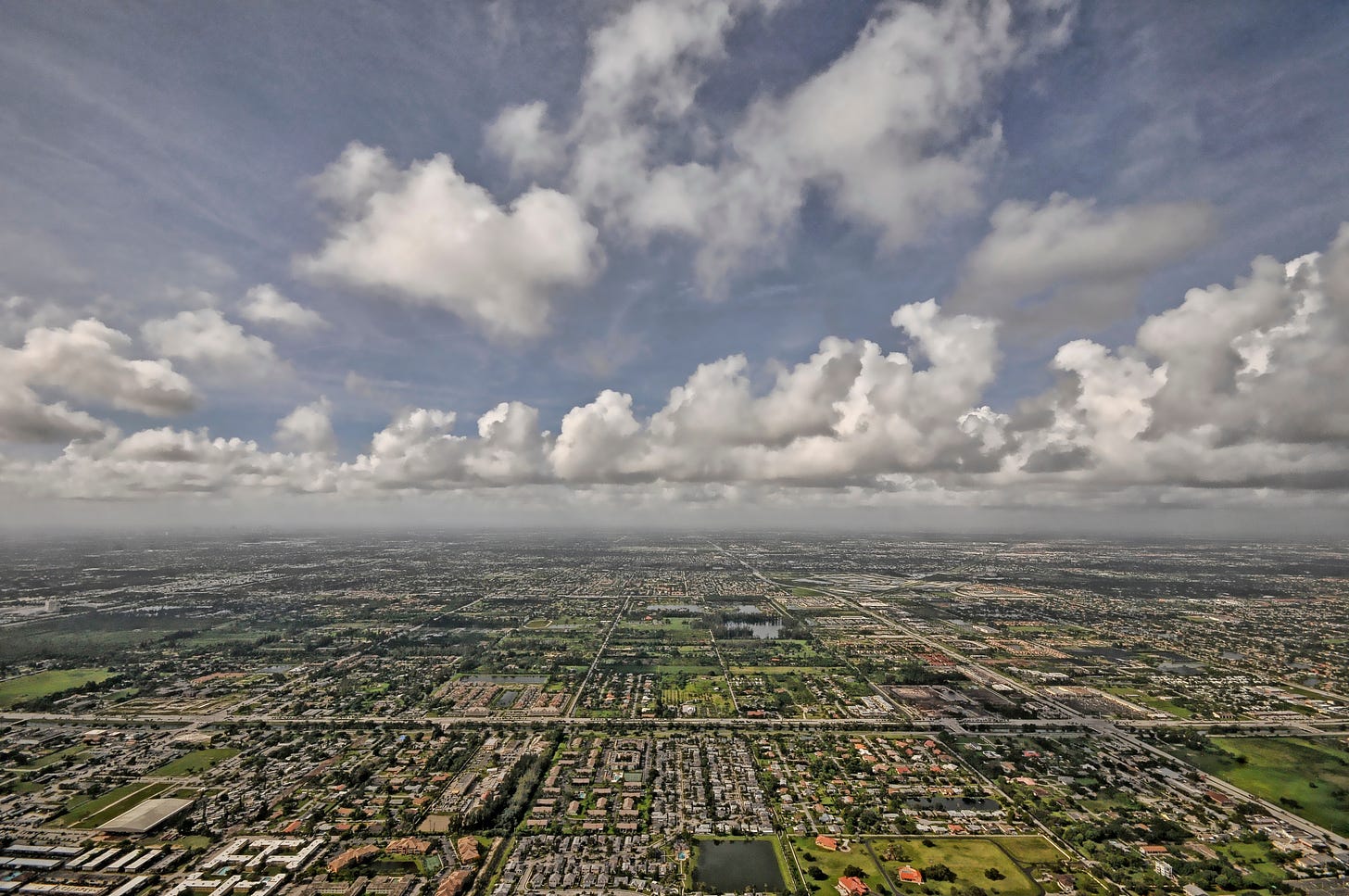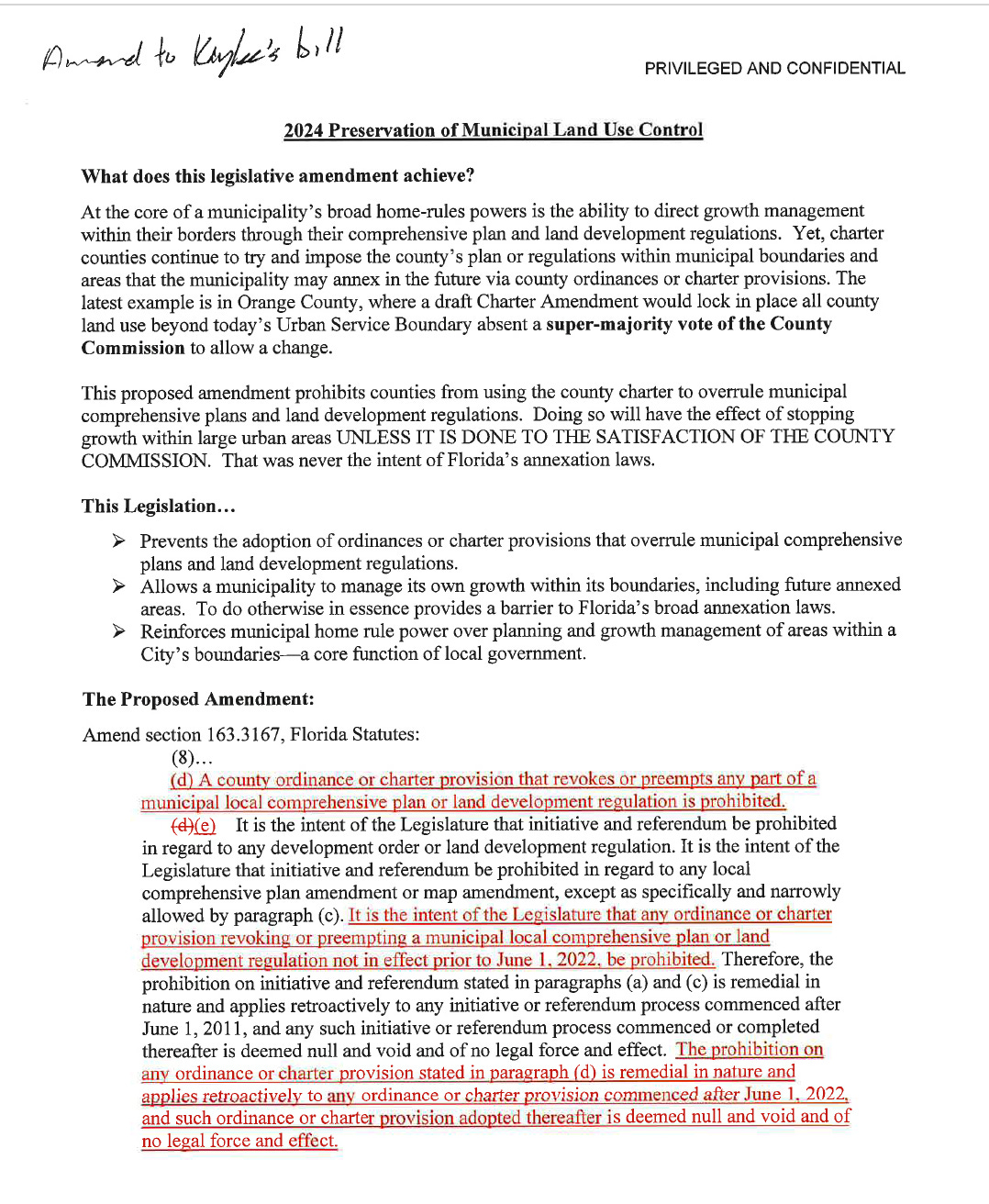Lobbyists for developers pushed Florida lawmakers to block rules meant to save rural lands from sprawl
Records show a group representing two giant Orlando developers lobbied Florida lawmakers to block a proposed "rural boundary" in Orange County.

This is Seeking Rents, a newsletter and podcast devoted to producing original journalism — and lifting up the journalism of others — that examines the many ways that businesses influence public policy across Florida, written by Jason Garcia. Seeking Rents is free to all. But please consider a voluntary paid subscription, if you can afford one, to help support our work.
Late in this year’s session of the Florida Legislature, lawmakers slipped an extra sentence into what had been a benign and bipartisan bill dealing with the state’s Department of Commerce.
It was a small amendment but it had a big goal: To prevent voters in Orange County, the home of Orlando, from establishing new development rules that could save rural areas from suburban sprawl.
And who wanted Tallahassee to take control? Lobbyists representing a pair of giant central Florida developers with plans to build tens of thousands of homes across a vast swath of rural ranchlands east of Orlando.
Records obtained through a public records request show that an organization called the Association of Florida Community Developers lobbied the state’s Republican-controlled Legislature to step in and block the effort to establish a “rural boundary” in Orange County.
The Association of Florida Community Developers, or AFCD, is primarily comprised of about a dozen large-scale developers and homebuilders. Two of its members are Orlando-based Tavistock Development Co., which is part of a conglomerate owned by billionaire investor Joe Lewis, and Suburban Land Reserve, a development company owned by The Church of Jesus Christ of Latter-day Saints. And those two companies have begun to develop church-owned cattle pastures that ultimately reach all the way from Orlando to the Space Coast.
But Tavistock and the Mormon Church’s development plans could be complicated if Orange County were to establish a rural boundary — which is essentially a mechanism that prevents high-intensity housing on undeveloped lands far beyond existing city centers.
It’s an idea that is right now under consideration by a citizen-led panel that convenes every four years in Orange County and has the power to put proposed amendments to the county charter directly on the ballot for local voters to decide.
The Orange County Charter Review Commission has been discussing a proposed rural boundary amendment since July of last year. But the threat to the real-estate industry grew sharper in February, when a subcommittee tasked with studying the idea recommended that the amendment be placed on the November 2024 ballot.
That prompted the Association of Florida Community Developers — whose members also include the companies developing Lakewood Ranch near Sarasota, Wildlight north of Jacksonville, and Babcock Ranch in southwest Florida — to push Florida lawmakers to intervene.
Emails show that a lobbyist for AFCD provided lawmakers with an early draft of what eventually became the last-minute amendment to Senate Bill 1420 meant to block Orange County’s rural boundary plan.
Now, Florida lawmakers ultimately didn’t go as far as the developers wanted.
The proposal from AFCD would have stopped counties from setting any kind of permanent development restrictions that would endure even if a city annexed the land. That’s no coincidence: Tavistock just got the city of Orlando to annex the first 6,000 acres of church-owned land that it and Suburban Land Reserve are developing — and it plans to have the city continue gobbling up more of that land over time.
But the provision that lawmakers ultimately added to SB 1420 would specifically stop any “citizen-led county charter amendment” that bypasses a local county commission — like a proposal placed directly onto the ballot by a charter review commission.
To be fair, this is a complex issue. Overly restrictive zoning and land-use controls — which are largely determined by local governments and often popular with voters who already own a home — constrict the supply of housing. They have been a key contributor to the affordable housing crisis in Florida and other states — and to income inequality across the United States.
Rural boundary supporters counter that unfettered suburban sprawl does nothing to help with affordable housing — and arguably makes the problem worse, as developers chew up the cheapest available land for predominantly higher-end housing stock. And they say the goal of a rural boundary is to encourage more infill development and redevelopment in urban areas, where it can be denser, more cost-effective for taxpayers, and build more critical mass for infrastructure such as public transit.
But Republican leaders in Tallahassee made sure there was no chance for any good-faith debate on the issue. The amendment blocking Orange County’s rural boundary didn’t surface in public until 24 hours before lawmakers first voted on it. And they added it to SB 1420 on the floor of the Florida Senate — which meant that no member of the public ever had an opportunity to testify for or against it.
This may not be the last of it, though. That’s partly because Florida Gov. Ron DeSantis has yet to sign or veto SB 1420.
But it’s also because rural boundary supporters in Orange County are now pushing ahead with a scaled-back proposal designed to comply with the preemption passed by the Legislature — though local developers are fighting that idea, too.







Wholesale change in Tallahassee is what is needed to stop much of these Republican money grabs. Lots of Quid pro quo going on in the Corruption Capital of Tallahassee.
Why should programs plant trees when all Florida can do is rip them apart. We should have rural that demand maintenance. It creates more traffic, more cars, less transportation options. If consumers think these costs will magically disappear - they don’t the developers kick it down the road and you’ ll pay for it when you least expect it.